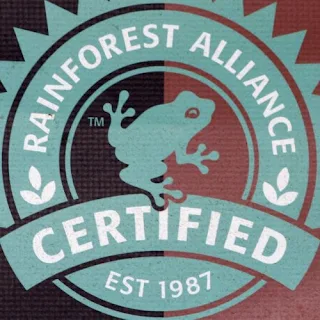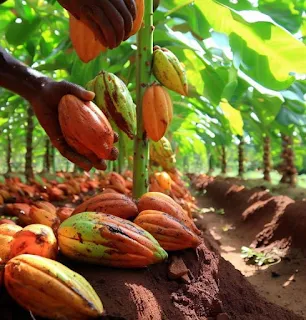The Future of Chocolate is in Your Hands
Before you bite, check to see if the label right by supporting the future of cocoa farmers and workers who are working in the chocolate industry in a socially and environmentally responsible way.
Chocolate manufacturers often source cocoa from multiple countries, including Africa, and blend it together to create their products. However, it is important to note that not all chocolate sold at convenience stores or supermarkets is made from sustainably sourced cocoa. There are concerns about child labor and other human rights abuses in some cocoa-producing regions.
That a chocolate bar you just grabbed at the convenience store contains cocoa that was grown in Africa, so before you eat that piece of chocolate check the label to insure the chocolate was sustainably sourced. You can tell if the chocolate was sustainably sourced by the Fairtrade and Rainforest Alliance certification labels.
Also, chocolate manufacturers can ensure a reliable and high-quality supply of cocoa that meets their ethical and sustainability standards. Ultimately, these certifications help to ensure that the chocolate we enjoy is not only delicious but also responsibly sourced.
The chances that a chocolate bar sold at a convenience store was made from cocoa grown in Africa are quite high.
This is because Africa is the largest cocoa-producing region in the world, accounting for around 70% of global cocoa production. Countries such as Cote d'Ivoire, Ghana, Nigeria, Cameroon, and Togo are all major cocoa producers in Africa.
Many chocolate manufacturers source their cocoa from multiple countries, including those in Africa, and blend them together to create their products. It's important to note, however, that not all chocolate sold at convenience stores or supermarkets is made from sustainably sourced cocoa, and there are concerns about child labor and other human rights abuses in some cocoa-producing regions.
In recent years, there has been an increasing concern about the ethical and sustainable sourcing of cocoa, the main ingredient in chocolate production. Cocoa is a vital cash crop for many developing countries, particularly in West Africa, where it provides a livelihood for millions of small-scale farmers. However, the cocoa supply chain is often associated with a range of social and environmental issues, such as child labor, deforestation, and poor working conditions.
Therefore, it is important for you to look on the back of the chocolate bar for the Fairtrade and Rainforest Alliance certification to ensure that the cocoa used in their chocolate has been sourced in an ethical and sustainable way.
The Fairtrade and Rainforest Alliance certifications are two of the most recognized certification projects for sustainable and ethical cocoa production.
They have established social, environmental, and economic standards that cocoa farmers and chocolate manufacturers must meet to receive certification. By purchasing chocolate products with these certifications, you can have confidence that they are supporting cocoa farming that is both environmentally friendly and socially responsible.
The Fairtrade certification scheme was established in 1997 and is operated by the Fairtrade International organization. It focuses on ensuring that farmers and workers in developing countries receive fair prices for their products, as well as social and environmental protections.
Fairtrade also promotes community development and empowerment by ensuring that farmers and workers are organized into cooperatives or associations. This allows them to have a greater say in decision-making and provides them with access to resources, such as credit and training, that can help improve their livelihoods.
For cocoa farmers, the Fairtrade certification means that they receive a minimum price for their cocoa that covers their production costs and provides them with a fair income. Additionally, they receive a Fairtrade premium, which is an extra payment that they can invest in their communities, such as building schools or improving healthcare facilities. The Fairtrade certification also prohibits child labor, forced labor, and discrimination, and requires that farmers follow environmentally sustainable farming practices.
Similarly, the Rainforest Alliance certification was established in 1987 and is focused on promoting sustainable farming practices, environmental conservation, and community development. The Rainforest Alliance works with farmers to promote sustainable agriculture that helps to protect biodiversity and natural resources. They also provide training and support to help farmers improve their productivity and profitability, while promoting social equity and good working conditions.
For cocoa farmers, the Rainforest Alliance certification means that they are using environmentally sustainable farming practices, such as minimizing the use of pesticides and protecting natural habitats. It also means that they are receiving a fair price for their cocoa and are working in safe and healthy conditions.
The Rainforest Alliance certification also prohibits child labor, forced labor, and discrimination, and requires that farmers provide their workers with access to education and healthcare. In addition to the benefits for cocoa farmers, there are also benefits for chocolate manufacturers and you.
By sourcing their cocoa from certified producers, chocolate manufacturers can ensure a reliable and high-quality supply of cocoa that meets their ethical and sustainability standards. You can also feel good about purchasing chocolate products with Fairtrade or Rainforest Alliance certifications, knowing that they are supporting cocoa farmers and workers who are working in a socially and environmentally responsible way.
Sustainably sourced means that the sourcing process takes into account the long-term impact on the environment, social equity, and economic viability, rather than just short-term gains. It is an approach that balances economic development with social and environmental responsibility, and aims to create a better future.
Explore more cocoa stories in the Chocolate Hub .






